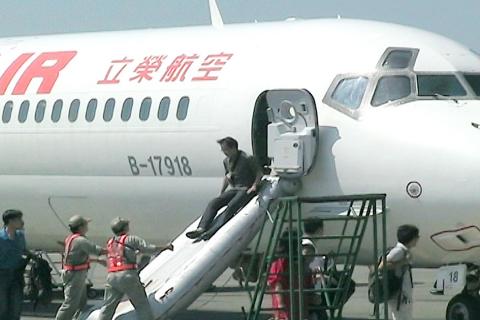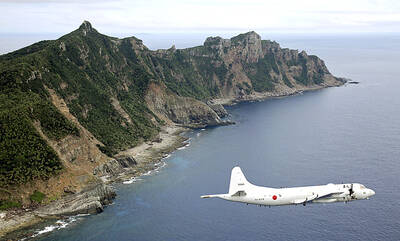Fifteen passengers were slightly injured yesterday as they were evacuated from an Uni Air (立榮航空)/EVA Airways (長榮航空) flight at Taiwan Taoyuan International Airport after smoke was reported coming from one of the plane’s engines.
Flight BR807 bound for Macau was scheduled to depart at 9am, but as the Mcdonnell Douglas MD-90 aircraft was accelerating, the captain noticed an engine warning signal. The captain decided to abort takeoff and taxied the plane back to the C2 ramp for inspection.
After reaching the C2 ramp, ground crew informed the cockpit that they saw smoke coming from the tail pipe of the plane’s No. 1 engine, prompting the captain to evacuate all the passengers.

Photo courtesy of a passenger surnamed Huang
The injuries occurred as passengers used the emergency evacuation slides to leave the plane.
“The 152 passengers descended quickly via the emergency evacuation slides following the instructions of the captain and flight attendants,” EVA spokesperson Nieh Kuo-wei (聶國維) said. “Fifteen passengers were slightly injured during the evacuation. They were able to continue on their trip after being treated by medical professionals.”
The airline apologized for delay and gave each passenger a hongbao (red envelope) and a meal coupon. Passengers finally departed at 2:40pm on a replacement plane.
Television news reports said some passengers complained that the plane had braked suddenly close to takeoff, while others blamed their injuries on skewed evacuation chutes and the lack of personnel on the ground to assist passengers as they slid down the chutes.
One woman said some passengers had asked for another cabin door to be opened because the smell of oil and smoke was making them nauseous, but flight attendants ignored the request.
Authorities said the plane had been in service for 14 years.
The Aviation Safety Council said it would hold a meeting to determine whether it or the Civil Aeronautics Administration should investigate the incident.
The council’s managing director, Thomas Wang (王興中), said the determining factor was whether there had been a fire in the engine.
“If the engine was on fire it would constitute an accident and the council would have to investigate,” Wang said. “If the smoke from the engine was caused by other factors, then it becomes a flight safety incident, which should be investigated by the Civil Aeronautics Administration.”

MISINFORMATION: The generated content tends to adopt China’s official stance, such as ‘Taiwan is currently governed by the Chinese central government,’ the NSB said Five China-developed artificial intelligence (AI) language models exhibit cybersecurity risks and content biases, an inspection conducted by the National Security Bureau (NSB) showed. The five AI tools are: DeepSeek, Doubao (豆包), Yiyan (文心一言), Tongyi (通義千問) and Yuanbao (騰訊元寶), the bureau said, advising people to remain vigilant to protect personal data privacy and corporate business secrets. The NSB said it, in accordance with the National Intelligence Services Act (國家情報工作法), has reviewed international cybersecurity reports and intelligence, and coordinated with the Ministry of Justice Investigation Bureau and the National Police Agency’s Criminal Investigation Bureau to conduct an inspection of China-made AI language

LIMITS: While China increases military pressure on Taiwan and expands its use of cognitive warfare, it is unwilling to target tech supply chains, the report said US and Taiwan military officials have warned that the Chinese People’s Liberation Army (PLA) could implement a blockade within “a matter of hours” and need only “minimal conversion time” prior to an attack on Taiwan, a report released on Tuesday by the US Senate’s China Economic and Security Review Commission said. “While there is no indication that China is planning an imminent attack, the United States and its allies and partners can no longer assume that a Taiwan contingency is a distant possibility for which they would have ample time to prepare,” it said. The commission made the comments in its annual

‘TROUBLEMAKER’: Most countries believe that it is China — rather than Taiwan — that is undermining regional peace and stability with its coercive tactics, the president said China should restrain itself and refrain from being a troublemaker that sabotages peace and stability in the Indo-Pacific region, President William Lai (賴清德) said yesterday. Lai made the remarks after China Coast Guard vessels sailed into disputed waters off the Senkaku Islands — known as the Diaoyutai Islands (釣魚台) in Taiwan — following a remark Japanese Prime Minister Sanae Takaichi made regarding Taiwan. Takaichi during a parliamentary session on Nov. 7 said that a “Taiwan contingency” involving a Chinese naval blockade could qualify as a “survival-threatening situation” for Japan, and trigger Tokyo’s deployment of its military for defense. Asked about the escalating tensions

DISPUTE: A Chinese official prompted a formal protest from Tokyo by saying that ‘the dirty head that sticks itself out must be cut off,’ after Takaichi’s Taiwan remarks Four armed China Coast Guard vessels yesterday morning sailed through disputed waters controlled by Japan, amid a diplomatic spat following Japanese Prime Minister Sanae Takaichi’s comments on Taiwan. The four ships sailed around the Senkaku Islands — known as the Diaoyutai Islands (釣魚台) to Taiwan, and which Taiwan and China also claim — on Saturday before entering Japanese waters yesterday and left, the Japan Coast Guard said. The China Coast Guard said in a statement that it carried out a “rights enforcement patrol” through the waters and that it was a lawful operation. As of the end of last month,